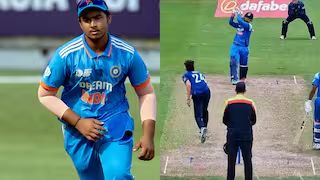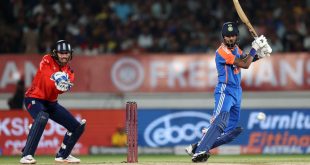New Delhi. Five-time champion Australia (Australia) registered its second consecutive win in the ICC Cricket World Cup 2023 by defeating Pakistan in a high-scoring match. Kangaroos defeated Babar Azam & Company by 62 runs in their fourth match. With this victory, the Australian team has moved from 7th to 4th. David Warner, who played an inning of 163 runs, was chosen player of the match. This is Pakistan’s second consecutive defeat in 4 matches. Earlier, India had demoralized Babar’s army by defeating it by 7 wickets in Ahmedabad. The Kangaroo team has moved from seventh to fourth in the points table.
In front of the mountainous target of 368 runs set by Australia, Pakistan team kept losing wickets at regular intervals. As a result, the entire Pakistan team collapsed for 305 runs in 45.3 overs. For Pakistan, opener Imam Ul Haq scored 70 runs in 71 balls with the help of 10 fours, while Abdullah Shafiq was out after scoring 64 runs. Captain Babar Azam returned to the pavilion after scoring 18 runs. Mohammad Rizwan was out after scoring 46 runs. For Australia, Adam Zampa took the maximum of 4 wickets while Marcus Stoinis took 2 wickets.
Warner and Marsh added 259 runs for the first wicket
Earlier, on the basis of century innings of David Warner (163) and Mitchell Marsh (121) and a partnership of 259 runs in 203 balls for the first wicket between them, Australia batted first and scored a big score of 367 runs for 9 wickets. Did. Warner played his fourth consecutive century against Pakistan by hitting 14 fours and nine sixes in his 124-ball innings. Marsh hit 10 fours and nine sixes during his second century innings.
For the fourth time in World Cup history, both openers scored centuries.
This is only the fourth time in World Cup history when both the opening batsmen scored centuries in the same match. This is the 21st century of Warner’s ODI career. At one time the Australian team was moving towards the score of 400 but due to the excellent performance of the bowlers in the last 10 overs under the leadership of Shaheen Shah Afridi (54/5), Australia was restricted to within 370 runs. During this, Warner made his second highest score of the World Cup by taking advantage of the two lives he got on 10 and 105 runs, while Marsh also played big shots easily, taking advantage of the flat pitch and short boundary of M Chinnaswamy Stadium.
Warner and Marsh scored runs easily
Pakistan’s bowlers also bowled poorly in the initial overs, on which Warner and Marsh had no problem in scoring runs. If Usman Mir had caught Warner on Shaheen’s ball at the beginning of the innings, Pakistan would not have had to face so much trouble. At this time Warner was on 10 runs while Australia’s score was 22 runs. After this Warner batted fearlessly. Pakistan captain Babar Azam gave the ball to Haris Rauf (83/3) in search of a wicket in the ninth over but Warner and Marsh scored 24 runs from this over.
Australia completed 300 runs in 41st over
Hasan Ali’s balls were getting swing in the initial overs but later Warner scored runs easily against him. During this, one of his six fell on the roof of the stadium. After this, Pakistan took the help of Usman and left arm spinner Mohammad Nawaz but the team did not get any benefit. Australia completed 300 runs in the 41st over after scoring 100 runs in the 13th over and 200 runs in the 30th over.
Warner scored his fourth consecutive century against Pakistan
Warner completed his fourth consecutive century against Pakistan with one run against Usman and then celebrated by jumping on the field. Marsh, who was celebrating his 32nd birthday, completed his hundred after this. However, Marsh returned to the pavilion after being caught by Usman off Shaheen’s ball. Shaheen dismissed Glenn Maxwell on the next ball without opening the account. However, Marsh and Warner could not break the record of the highest partnership for the first wicket in the World Cup. This record is of 282 runs which was made by Sri Lanka’s Tillakaratne Dilshan and Upul Tharanga in the 2011 World Cup.
 Indian Thought Latest News & Views
Indian Thought Latest News & Views



